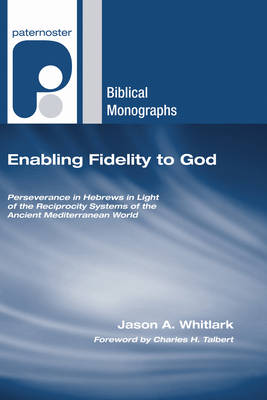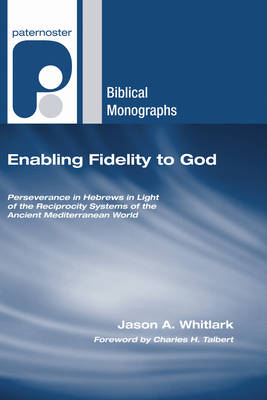
Bedankt voor het vertrouwen het afgelopen jaar! Om jou te bedanken bieden we GRATIS verzending (in België) aan op alles gedurende de hele maand januari.
- Afhalen na 1 uur in een winkel met voorraad
- In januari gratis thuislevering in België
- Ruim aanbod met 7 miljoen producten
Bedankt voor het vertrouwen het afgelopen jaar! Om jou te bedanken bieden we GRATIS verzending (in België) aan op alles gedurende de hele maand januari.
- Afhalen na 1 uur in een winkel met voorraad
- In januari gratis thuislevering in België
- Ruim aanbod met 7 miljoen producten
Zoeken
Enabling Fidelity to God
Perseverance in Hebrews in Light of the Reciprocity Systems of the Ancient Mediterranean World
Jason A Whitlark
€ 54,45
+ 108 punten
Uitvoering
Omschrijving
The primary focus of this book is to demonstrate how Hebrews represents, in view of its historical and religious context, human fidelity to God. Thus, the basic thesis is twofold. First, with regard to the divine-human relationship in the ancient Mediterranean world, the belief in the reciprocity rationale was one primary dynamic for establishing fidelity to a relationship and has been applied by some scholars, such as David deSilva, to Hebrews as the way to understand its strategy for creating perseverance. A major problem with the application of this dynamic is that a common optimistic anthropological assumption is associated with the various reciprocity systems in the ancient world, both Jewish and pagan. This assumption is required if reciprocity is to be effective for establishing ongoing fidelity. Second, there was, however, a middle Judaic stream that can be traced from the period of the exile which held to a pessimistic anthropology. This anthropological assumption crippled the perceived success of reciprocity to secure fidelity. Thus, the solution to God's people's inability to remain faithful was an act of God that transformed the human condition and enabled faithfulness to the relationship. The argument of this book is that Hebrews, with its emphasis upon the inauguration of the new covenant by Jesus' high priestly ministry, belongs to this latter stream of thought in understanding how fidelity is secured between God and his people. Hebrews, thus, implicitly rejects the rationale of reciprocity for fidelity. The implications of this offers a fresh perspective on the soteriology of Hebrews.
Specificaties
Betrokkenen
- Auteur(s):
- Uitgeverij:
Inhoud
- Aantal bladzijden:
- 242
- Taal:
- Engels
- Reeks:
Eigenschappen
- Productcode (EAN):
- 9781498253048
- Verschijningsdatum:
- 19/02/2009
- Uitvoering:
- Hardcover
- Formaat:
- Genaaid
- Afmetingen:
- 152 mm x 229 mm
- Gewicht:
- 521 g

Alleen bij Standaard Boekhandel
+ 108 punten op je klantenkaart van Standaard Boekhandel
Beoordelingen
We publiceren alleen reviews die voldoen aan de voorwaarden voor reviews. Bekijk onze voorwaarden voor reviews.









